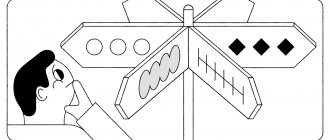Last Victory Day, an Omsk pensioner killed her roommate by stabbing him in the throat with a kitchen knife. Before this, the couple had not quarreled, at least the neighbors did not record disturbances in the calm. What’s even more interesting is that it turned out that this same old woman killed her previous partner with a knife seven years ago, also on Victory Day. Hence the question: could the deceased 72-year-old man have recognized a monster and murderer in his girlfriend in advance? Is it even possible to understand in advance that not everything is fine with a partner? What personality traits should you be wary of when choosing a life partner? And what to do if a dangerous partner is already nearby? Doctor of Medical Sciences, head of the department of forensic psychiatric prevention of the State Scientific Center for SSP named after V.P. told Lenta.ru about this, as well as about the chemistry of love and the right approach to creating a family. Serbian" Oksana Makushkina.
Violent and quiet
“There are a great many definitions of mental disorder,” Professor Oksana Anatolyevna Makushkina immediately dots the i’s. — But there is one definition of mental health. The starting point is a person’s ability to adapt to society. First of all, at work and in the family. In particular, do not create conflict situations, and also get out of them with minimal losses for yourself and others. The preservation of this possibility indicates a norm, if one can speak of a norm at all.
Of course, all normal people are different from each other - they have different temperament, character, level of intelligence... Apparently, everyone has heard about the four types of temperament: melancholic, phlegmatic, sanguine and choleric. Extreme types of characters, located on the border of the norm, are also well studied and are called accentuations.
In the qualifications of the famous Russian psychiatrist A.E. Lichko (1977) human characters are divided into 11 accentuations: hyperthymic (overactive), cycloid (activity is periodically replaced by depression), labile (with frequent mood swings at the slightest provocation), sensitive (shy and impressionable), astheno-neurotic (capricious, suspicious , irritable), schizoid (unable and unwilling to communicate with people), psychasthenic (prone to constant introspection, anxious), epileptoid (authoritarian, irritable, angry), hysterical (attention-seeking, demonstrative, self-centered), conformal (adapting to the situation) and unstable (lazy, susceptible to influence).
The starting point is a person’s ability to adapt to society...
Photo: Alastair Grant/AP
But, as Dr. Makushkina has already said, all normal people, no matter whether the accentuation in their character is bright or barely noticeable, epileptoid or psychasthenic, are able to control their words and actions, foresee the consequences of emerging situations and control them. If such a person breaks the law, he bears full responsibility for his words and actions.
Why is psychological violence dangerous?
Damaged self-confidence, fears, complexes, depressed mood,
even
depression
- these are the consequences of “bloodless” violence for the victim.
They are quite comparable to the damage caused, for example, by beatings. Experts have long trumpeted on every corner that psychological violence is just as destructive as physical violence. Only women who are accustomed to direct or veiled ridicule, insults, humiliation, neglect, and devaluation ignore the warnings and do not see the seriousness of the situation. “When sharing their stories, women often laugh and make jokes.
Like, just think: you came, stomped your feet, took the money - all the same, he says, you’ll go crazy,” says the psychologist.
psychological defense
manifests itself in those who are not ready to look for a way out of the current situation. The woman shared her emotions, relieved the tension - and that was all. She is again ready to endure the barbs of someone who craves power over her.
rileylawfirm.net
Two types of ill health
“If we talk about the problem of mental illness,” continues Oksana Makushkina, “the medical community adheres to the classification of diseases. Currently this is ICD-10 - International Qualification of Diseases, 10th revision. In accordance with it, mental disorders are divided into two large groups: severe, pronounced disorders, and less severe, so-called borderline ones.
The first group includes schizophrenia spectrum disorders, in which control over behavior may be largely lost. A sick person has a changed worldview and relationships with other people, and often there is also a pathological motivation for behavior. If such a person commits illegal actions, there is a high probability that he will be declared insane.
The second group includes personality disorders, or in the old terminology - psychopathy, as well as neurotic disorders. Personality disorders, or psychopathy, affect, according to various sources, from 4 to 15 percent of the world's population. Among the causes of occurrence: genetic predisposition, upbringing, consequences of stress and mental trauma, violence suffered, including sexual violence, head injuries.
Personality disorders differ from character accentuations in a greater degree of severity. That is, these are character traits, but greatly exaggerated. The line is quite thin, but accentuations are not as stable over time as psychopathy and do not lead to social maladjustment. On the other hand, what distinguishes personality disorders from schizophrenia is that they have virtually no dynamics throughout life, that is, they do not develop. People with personality disorders, if they commit a crime, are usually recognized as sane and are held responsible for their actions.
Aggression
Aggressive behavior can be observed in a patient both during an exacerbation and during remission. What to do? First of all, never argue. This is ineffective and also unsafe. It is necessary to try to verbally reassure the patient, go to another room, and give him the opportunity to come to his senses. Be sure to seek help from a doctor, do not delay hospitalization out of pity.
In what situations can aggressive behavior be observed? For example, if you prevent the patient from doing what he loves. No matter how strange this hobby may seem to you, it can be of great significance to your loved one. And any interference will be regarded as an encroachment on his personal space. You need to learn to control your negative emotions. In response to your dissatisfaction, the patient may respond with an aggressive response.
Show your radical
“A personality disorder is a pathological makeup that prevents a person from adapting, behaving adequately, and acting in such a way as to get out of different situations with minimal adverse consequences,” explains the professor. — Such people have a limited range of possibilities and solutions, unlike a normal person. However, they are able to foresee the consequences of their actions.
Without any prerequisites or symptoms...
Photo: Grigory Sysoev / RIA Novosti
The range, by the way, is limited only in conditions of crisis, or, as doctors say, decompensation. When, due to additional stress and failures, psychopathic personality traits appear so clearly that they become noticeable to others.
— A person with a personality disorder will always react to decompensation with his personal radicalism. The psychasthenic will go into depression, the schizoid will completely stop communicating with people, the hysterical will behave demonstratively and start breaking plates. If we consider decompensation from the perspective of possible harm to others, then we should pay attention to personality disorders associated with increased aggression. These are dissocial personalities (sociopaths), unstable and emotionally labile individuals - too excitable and hot-tempered. Decompensation in such people leads to aggression, unreasonable conflicts and even harm to others.
How to recognize such a person? It’s by these signs that you can recognize it. Yes, they have a reduced ability to adapt, and, yes, they are difficult in everyday life. But in the absence of psychotraumatic factors, in comfortable conditions, such people can be in a compensated state for a long time, that is, live and work normally, be in excellent relationships with loved ones and work colleagues.
How to communicate with psychopaths?
If you want to maintain your mental health, it is better not to communicate with them at all. You can and should abstract yourself from them. If fate brings you together with a psychopath in your personal life, run away from him, if with your boss, quit. If the psychopath is a colleague you meet every day, but who is not your manager, simply ignore him, no matter what he says or does.
Photo from the site www.wmj.ru
And most importantly, trust your instincts and intuition. If you think someone has psychopathic traits, stay away from that person to avoid being manipulated or pulled into a relationship that will only hurt you.
Fell, woke up...
Borderline disorders are not always an inherent personality trait. They can appear after suffering exogenous hazards: head injuries, neuroinfections (encephalitis, meningitis), intoxication, including alcohol surrogates, which adversely affect the brain. But most often these are injuries.
A person has an accident, gets hit on the head, a year and a half passes, and suddenly the one who was previously calm and balanced becomes hot-tempered, irritable, picky, and does not tolerate alcohol well. As a rule, such people react to changes in weather - their mood changes, irritability increases.
- What should be done in this case? - Professor Makushkina continues to explain. — If an injury or severe infection occurs, you need to get help from a neurologist: nootropics, vascular drugs that improve the functioning of the brain, must be used in courses and not just once, but for a long time. The reversibility of symptoms depends on the severity of the injury, the person’s ability to recover, age and treatment. In any case, this disorder will not go away on its own.
Professor Oksana Makushkina
Photo: Pavel Orlov / Lenta.ru
Suicides
Suicidal behavior is another problem that relatives of patients with a psychiatric diagnosis may face. And the most unpleasant thing about this behavior is the fact that a suicide attempt is difficult to predict. A person can carefully hide his intentions if he has made a final decision. Sometimes the patient manipulates in order to attract attention or gain some benefit. However, distinguishing between a demonstrative patient and a patient who has decided to commit suicide can be difficult and sometimes impossible. The most dangerous is the so-called extended suicide, when the patient decides to “save the suffering” of other people, for example members of his family. And first he kills his relatives, and then himself.
Transmitter in a toothbrush
— If we are talking about severe mental disorders, then we must understand that a schizophrenia spectrum illness can debut at 30 and 40 years of age. Without any prerequisites or symptoms. An acute condition develops in a person who has not had any illness before. Suddenly he begins to behave unusually, listens to something, brushes off someone, talks to a non-existent interlocutor. He believes that he is being watched, his neighbor wants to harm him, influences him, controls his thoughts. At the same time, it is impossible to dissuade the patient (this is what characterizes delusional ideas - they arise without a real reason and cannot be corrected from the outside). He declares that he is being hunted by some service that has implanted transmitters everywhere, even in his toothbrush. Delirium can also spread to loved ones. The husband or wife turns into “secret service agents.” In some cases, a person completely withdraws into himself, and the visible symptoms remain unusual behavior, complete isolation, and wariness. The motives for the actions and the actions of the patient themselves do not correlate in any way with reality. With such diseases, we are not talking about trauma or stress.
The biggest mistake relatives make in such a situation is to let it take its course. They say he must pull himself together and show willpower. Such problems do not solve themselves. Moreover, there is a high risk that the patient will commit socially dangerous actions and cause harm to himself or others.
In such cases, immediate professional help is needed, and the sooner the better. Because the sooner the acute condition is stopped, the more favorable the prognosis and the fewer consequences for mental activity.
- How is it happening? - the professor gets upset. “Often people, even knowing that their relatives have mental disorders, knowing that they were seen by a psychiatrist, do nothing to ensure that this person continues to go to the doctor and receive supportive therapy, which in most cases evens out aggressive tendencies. In a sense, they are digging their own hole.
Intelligent books on communication
- “How to Talk to Assholes”, Mark Goulston - “Never Eat Alone”, Keith Ferrazzi and Tal Rez - “We turn on the charm using the secret services method”, Jack Schafer and Marvin Carlins - “Secrets of Great Speakers” - James Humes - “ Key Negotiations”, Kerry Patterson, Joseph Grenny and Ron McMillan (in the process of reading, but already enjoying it)
Several book reviews: - 30 smart books on business, self-development and creativity that changed my life - 5 best books for an aspiring entrepreneur + 1 advice - 5 books that will help you think outside the box and why it is important right now
A psychiatrist is not a sentence
“Lenta.ru:” Oksana Anatolyevna, but you understand that going to a psychoneurological dispensary is a stigma for a Russian person. If people find out about visits to a psychiatrist, a person will hardly be able to avoid teasing and ridicule. His friends will begin to feel sorry for his wife, and she herself will periodically call her husband a moron. Not to mention the problems with obtaining a driver's license, hunting license, and finding employment.
“First of all, I tell you with full responsibility,” here Dr. Makushkina is on her territory, “that seeking advice from a psychiatrist does not at all mean registration. In accordance with the Law “On Psychiatric Care” there is consultative and therapeutic assistance and dispensary observation. The first is carried out as a person applies, and no one will register him. The law stipulates that only persons suffering from a chronic and protracted mental disorder with severe, persistent or frequently exacerbating painful manifestations are subject to dispensary observation. There are clear indications. Moreover, a person cannot be taken under dispensary observation by the attending physician, but only by a commission of psychiatrists. Restrictions on obtaining a driver's license and the right to own a gun are associated exclusively with severe mental disorders such as schizophrenia. So don’t think that if you go to a psychiatrist, you won’t be given a license later.
Secondly, after its debut, a severe mental disorder most often has a chronic course. If a person stops maintenance therapy, their condition will worsen. As soon as relatives notice a resumption of the disease, they need to contact a psychiatrist. The main thing is to understand: severe mental disorders do not go away on their own.
Thirdly, you are talking about a driver’s license and a hunting license... You know, there are cases when people with severe mental disorders, having a gun, use it. Are you sure such people need guns and cars?
FSBI "SSC SSP named after V.P. Serbian"
Photo: Grigory Sysoev / RIA Novosti
Refusal to take medications
With schizophrenia, in addition to thinking and the emotional sphere, the patient’s critical attitude towards himself also suffers. Patients often ask the doctor to reduce the dosage of medications, and often they themselves “quietly” stop taking the medications. They motivate this with the words “I feel better.” It is not possible to influence the patient's decision through persuasion. The result of refusing to take medications is placement in a hospital. After discharge, the scenario repeats. What can you offer relatives? In modern psychiatry, there are prolongation drugs - medications that are prescribed by injection once or twice a month. They are as effective as tablets and are more convenient to take.
Energy in a peaceful direction
The patient, diagnosed with schizophrenia, a young, beautiful woman, discontinued her medications on her own after discharge.
Over the course of a month, there was a sharp deterioration in his condition: delusions of religious content, aggression towards relatives and, as a result, forced hospitalization. This was repeated until a certain point, until something changed her attitude towards treatment. Perhaps it was the reluctance to end up in the hospital again. Maybe the endless conversations with the doctor had an impact. But the following happened: she began to regularly take medications and visit her doctor. The woman channeled her irrepressible energy into helping homeless people. She picked them up on the street, gave them food and shelter in her home for a while, then accompanied them to a shelter for the needy. She spoke enthusiastically about her charitable activities. This patient was never admitted to the hospital again. Do you want your wish to come true? We invite you to a transformational psychological game that will make your dreams come true!
Prepare for the worst consequences
Psychopaths can redirect all the arguments said against him against you. Get ready for his counterattacks in the form of slander, spreading gossip, and refutations of your words: “it happened for other reasons,” “we were children and it is impossible to remember the reasons for what happened,” “she was under severe stress at that moment,” and so on. ... An attack can look different. If your communication consists of correspondence on the Internet, through social networks, then he can use them against you by starting to openly comment on your photos on Instagram, discuss you in VKontakte groups, and the like.
How to get away from a tyrant: 100% ways










